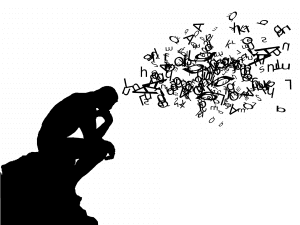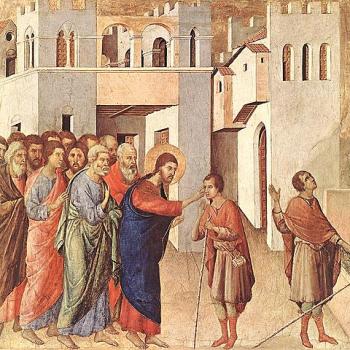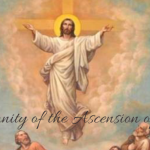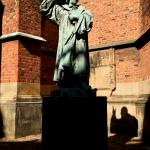
When at church, or when we are meditating at home, all kinds of stray thoughts often go through our head. Whether or not they are wholesome, they can be distracting, as they have us think of things other than what we are doing. We should not let this bother us. If we don’t pay attention to them, they will leave us as quickly as they came. This is why it is best that we ignore them when we can. If we don’t, if we try to engage them, even if it is to fight against them and what they suggest, they will stay with us. That is when our troubles really begin. For instead of focusing on what we are doing, such as praying, we become focused on our thoughts, sometimes being encouraged by them to do all kinds of things which we should not do, but other times, left wondering why they came up. We should just accept that our mind often produces all kinds of thoughts from unconscious stimuli. We might never know how or why they arose. This way we should not let ourselves be distracted by them. While we might wish we had better control of ourselves, so that we could stop such thoughts from entering our minds, we must realize, as Abba Poemen told one of his disciples, most of us cannot do that anymore than we can stop ourselves from breathing:
A brother came to see Abba Poemen and said to him, ‘Abba, I have many thoughts and they put me in danger.’ The old man led him outside and said to him, ‘Expand your chest and do not breathe in.’ He said, ‘I cannot do that.’ Then the old man said to him, ‘If you cannot do that, no more can you prevent thoughts from arising, but you can resist them.’[1]
Modern psychology talks about the unconscious element of our psyche and how it influences us; that is, we learn that we do not normally have a full and conscious control over our mind. There are so many processes going on in our mind and most of them are done without our conscious awareness. Many of our thoughts come from these processes. They are not consciously developed by us. When we become aware of them, we can try to discern their causes and see if there is something which we can do which will help eliminate them. Nonetheless, when we do this, we risk them becoming more powerful, more central to who we are and what we do in a day. We can become so obsessed with understanding our unconscious psyche we lose out on life itself. This is why, for the most part, the best thing we can do is ignore them. Even when we engage silence and try to silence our mind from all thoughts, it is normal for what lies in our unconsciousness to reveal itself to us. When this happens, once again, the key is to let them quickly arise and depart by not paying attention to them. If we do not become concerned about them, if we do not become disturbed by the fact that they came to us and revealed themselves to us while we were trying to meditate, we will be able to return to our meditative silence. Of course, such thoughts can and will often return later, which is why Abba Poemen said we can’t prevent them from arising, only that we should not let them get the best of us. It is a practical point; most people will never fully be able to silence their thoughts for any prolonged period of time. They might, of course, experience such silence for a moment or two at a time, but then when they notice that their thoughts are gone, it is easy for them to begin to think about such silence, and in doing so, find their silence has been broken.
It doesn’t matter what thoughts emerge from our psyche. We should not let them rule us and our conscious life. We should not be ashamed of them, especially because we do not know how they were seeded into our minds. We see and experience much every day, and we are processing it all, sometimes consciously, but mostly unconsciously. We are experiencing that processing when such thought emerge, indeed, it is when we have silenced many conscious thoughts and aspects of our lives that our unconscious processing becomes much more apparent to us. This is also why, when we dream, we also encounter various odd images and ideas, for when we are dreaming, we are also letting elements of our unconsciousness reveal themselves to us. Thus, we should treat such thoughts when they emerge during prayer or meditation as we treat our dreams. When we awake, we tend to forget them, and even those which we remember do give us much concern. We realize they are not real, and what happens in them does not necessarily indicate anything about our own character. The same, then, is true with various odd thoughts which cross our mind. There are all kinds of sources for their emergence, and so they do not necessarily indicate anything about our own character. We must realize how our experiences in life such as our socialization with others influence our unconsciousness, seeding in it all kinds of odd thoughts. Thus, much of what goes on in our minds, much of those thoughts which suddenly rise up as if out of nowhere, reveals to us what has been seeded in our minds from our interaction with the world at large. If we let them flow through our mind without attachment, they will not become planted into our psyche and take root. Now, we must be careful. While we find that they come to us from outside influences, we must not assume the solution is to avoid the world, to avoid people, that is, to become hermits. Even hermits, isolated as they are from society, experience all kinds of things in a day, and through those experiences, seed their minds with the foundations for all kinds of thoughts. Instead, we should keep in mind what Abba Poemen suggested. We must not let ourselves be concerned about the thoughts which emerge; rather, we must realize, just as we must breathe, and breathing is most often not a conscious effort, so our minds will be processing all our experiences, and it does so for our own good. If we make too much out of it, if we let it disturb us, then we will not allow our mind to fulfill its proper duty.
[1] The Sayings of the Desert Fathers. trans. Benedicta Ward (Kalamazoo, MI: Cistercian Publications, 1984), 171 [Saying of Abba Poemen 28]
Stay in touch! Like A Little Bit of Nothing on Facebook.
If you liked what you read, please consider sharing it with your friends and family!

















